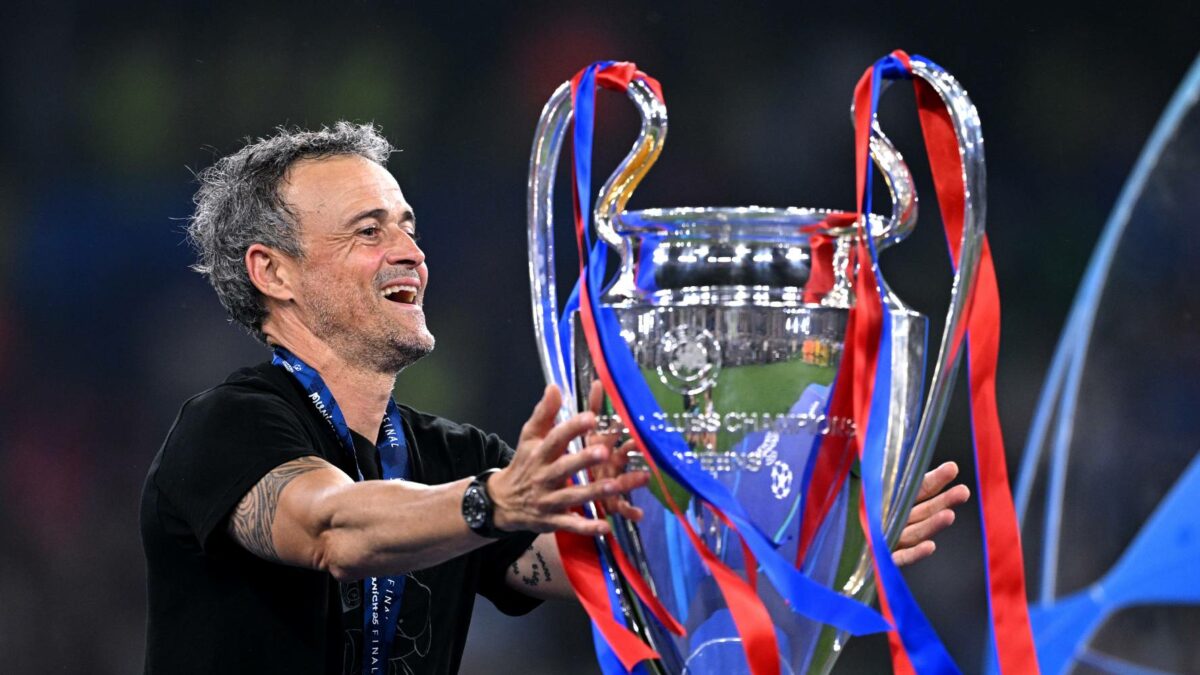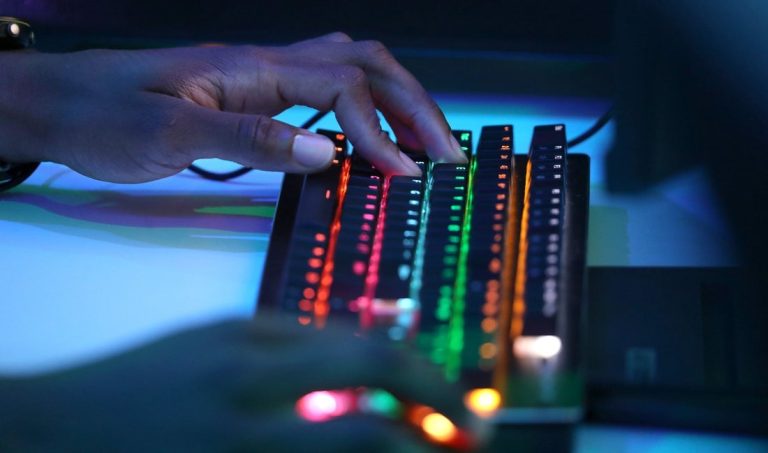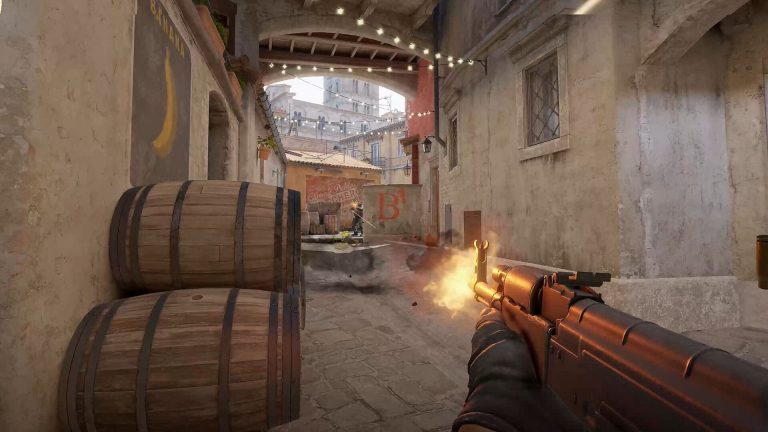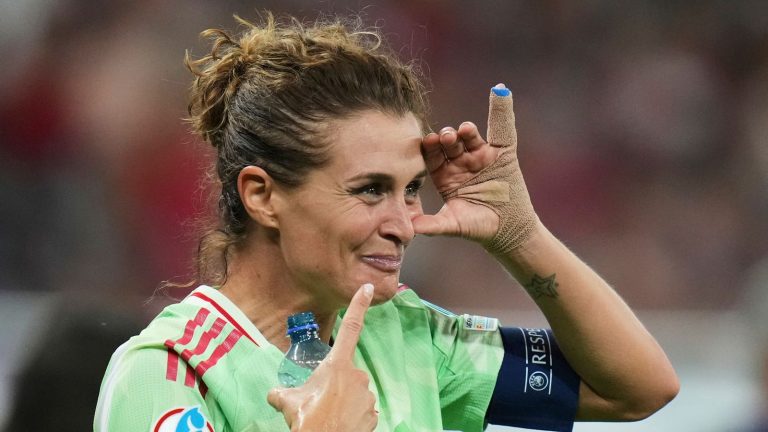When Luis Enrique took charge of PSG on July 5th 2023, there was not too much optimism surrounding the potential success that could be had under the Spaniard. This was understandable, given Enrique had just departed his post as Spain National Team manager after three mixed years, which included a disappointing 2022 World Cup Round of 16 exit to Morocco via penalties.
Enrique’s style of play was what many following PSG had doubts over. While he enjoyed success with a possession-based style of play in the mid-2010s with Barcelona, as the game evolved, the 55-year-old failed to, and paid the price for it, with his Spain side often dubbed as players of boring and safe football.

Luis Enrique, Head Coach of Paris Saint-Germain, reacts as he walks past the UEFA Champions League trophy after collecting his winners medal after defeating FC Internazionale, to secure Paris Saint-Germain’s first ever UEFA Champions League title. (Photo by Justin Setterfield/Getty Images)
The Spaniard’s first season in charge of the Parisians did not show major changes to the philosophy, but it was still enough to comfortably win the Ligue One over Marseille by 19 points – as we have grown accustomed to by this stage. However, it was in the Champions League where it became clear that progress still needed to be made, with PSG again falling short in the knockout stages to Dortmund by an aggregate of 2-0 despite dominating the stat sheet across both legs.
What was expected to be a crunch season for Enrique this term started incredibly shaky, especially in the Champions League, where Paris were at one point staring down the barrel of an embarrassing group stage elimination. But when it all seemed lost and his future now on thin ice, Enrique managed to conjure a magical recovery.
Tactically, a key catalyst in PSG’s stark transformation under the Spanish manager has been the rebirth of forward Ousmane Dembele into a Ballon d’Or candidate, who many had already passed as a failed wonderkid following a disappointing tenure at Barcelona.
Dembele has put up career-best numbers this season and become the unique focal point of PSG’s attack with 35 goals and 16 assists from 52 games in all competitions, which has been attributed to Enrique’s recognition of utilising the forward’s unique skill set in a more central position compared to his usual wing role.
As a false nine, Dembele was handed the freedom to float anywhere across the frontline, unlike his past deployments as a touchline winger, bringing others into play and scoring at ease with his unmatched two-footed qualities.
The 28-year-old has also adopted a greater leadership role by setting the example with his off-ball commitments under Enrique, which is only beginning to gain recognition recently. Notably, the French forward’s constant pressing gave Inter Milan keeper Yann Sommer no time to breathe in the Champions League final, a big factor that led to the Italian side’s eventual collapse.
This hunt mentality from Dembele has been instilled by Enrique into the rest of the squad as well, which is a shift in mindset that has changed the whole perception of PSG. In the past, PSG would make it a priority to accommodate big names in the team, such as Kylian Mbappe, Neymar, and Lionel Messi, who, while they are considered some of the greatest players of all time, are not the hardest workers without the ball.
While the star power brand of football dazzled occasionally, it was never built for long-term success at the highest level, which is why Enrique was surprisingly content with letting go of the club’s greatest ever player, Kylian Mbappe, to Real Madrid last summer for free in the hopes of starting afresh with a more unified squad that is willing to work and play for each other consistently.
Although it is hard to replace Mbappe’s match-winning qualities fully, Enrique has arguably made his setup more potent by instead adopting a fluid attacking system through sharing the creative load among the likes of Dembele, Desire Doue, Bradley Barcola, and Kvicha Kvaratskhelia.
Additionally, Enrique trusting the midfield reins to Vitinha has elevated the former Wolves loanee to the status of arguably the best midfielder in the world, to the immense delight of the club.
Vitinha’s technical insurance in build-up, complemented by all-action summer signing João Neves and the goal-scoring Spaniard Fabian Ruiz, has allowed Enrique to play his traditional possession game at the core, but also indulge in and adapt to scrappy physical battles when need be.
This superior control of the midfield third, when complemented by the speed up front and much improved reassurance at the back, led by captain Marquinhos, pacey fullbacks Achraf Hakimi and Nuno Mendes, and towering keeper Gianluigi Donnarumma, makes for a scarily balanced side that can beat you in a multitude of ways.
With tough decisions made to ensure that old stigmas are buried, as well as smart calls that have maximised the strengths of the many talented, but previously maligned assets, Enrique has transformed PSG from once being known as the ‘farmers’ of Ligue One, to now arguably one of the most complete sides in the world this season.
When Qatari Sports Investments ambitiously took over the French club back in 2011, they had the vision to become the best club side in the world, and now, after over a decade of what-ifs, the early vision is beginning to come together, with the evergreen Luis Enrique at the forefront of this remarkable ascent.







